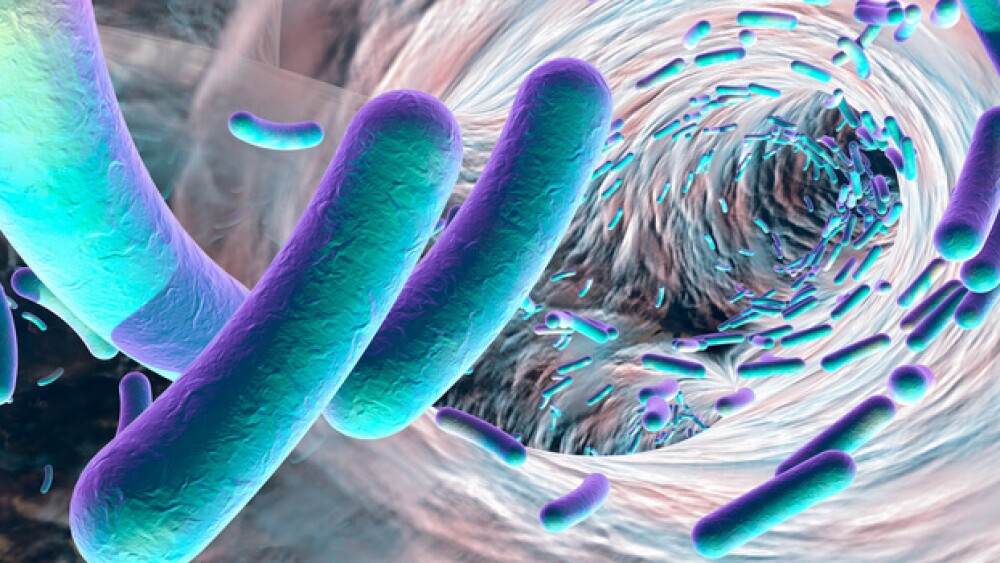Finch Therapeutics reported positive topline results from PRISM3, its Phase II trial of CP101, an oral microbiome drug for the prevention of recurrent C. difficile infection.
Pictured: Illustration of a biofilm of antibiotic resistant bacteria/ ShutterStock, Kateryna Kon
The microbiome is the trillions of microorganisms that live in and on the body. Increasingly, they are found to play a significant role in numerous diseases ranging from gastrointestinal disorders to amyotrophic lateral sclerosis (ALS) and other diseases. Researchers believe that by manipulating the microbiome, they may be able to treat those diseases.
Finch Therapeutics reported positive topline results from PRISM3, its Phase II trial of CP101, an oral microbiome drug for the prevention of recurrent C. difficile infection (CDI). Clostridioides difficile infection is a dangerous antibiotic-resistant bacterial infection. According to the U.S. Centers for Disease Control and Prevention (CDC), it is one of the most urgent antibiotic-resistant infections in the U.S. and most common healthcare-associated infections, particularly in nursing homes. It can cause life-threatening diarrhea and is noted for high rates of recurrence after standard-of-care antibiotic therapies. About 500,000 people in the U.S. are diagnosed with CDI annually, with about 45% experiencing a recurrence after treatment. It is associated with more than 29,000 deaths in the U.S. each year.
CP101 is an investigational, oral microbiome drug designed to deliver complete microbiome communities in an oral, enteric release capsule. In addition to being tested for recurrent C. diff infection, it is being studied for the treatment of chronic hepatitis B.
The PRISM3 trial met the primary efficacy endpoint, with 74.5% of recurrent CDI patients who received it achieving a sustained clinical cure through week eight. This was compared to 61.5% of patients in the control group who received standard-of-care antibiotic therapy alone, which is statistically significant. The therapy was well-tolerated at eight weeks after treatment, with no treatment-related serious adverse events.
The study randomized 206 people with recurrent CDI at 51 locations across the U.S. and Canada.
“These results are very encouraging and show that CP101 has the potential to fulfill the need for an oral drug that breaks the cycle of CDI recurrence, preventing the devastating effects of recurrent C. difficile infections on patients’ lives,” said Jessica Allegretti, principal investigator in the PRISM3 clinical trial at Brigham and Women’s Hospital in Boston. “This validates the approach of microbiome restoration and is a critical milestone for the field, opening the potential to develop this class of therapy for many other conditions arising from disruption of the microbiome.”
Antibiotics are designed to kill bacteria, and when used to treat C. diff infections, kills the C. diff, but also kills off much of the natural microbiome in the body. CP101 is designed to prevent recurrent CDI by restoring colonization resistance, the ability of a healthy microbiome to prevent colonization of possible pathogens—or bad bacteria.
Finch emphasizes that CPI101 is manufactured under Good Manufacturing Practices (GMP) conditions and undergoes rigorous testing.
At the same time, Finch also announced the initiation of the program to evaluate the therapy for chronic hepatitis B. This program is built around clinical evidence that hepatitis B virus e-antigen clearance following microbiome restoration, even in patients that did not achieve clearance after long-term antiviral therapy. The company plans to study if the therapy can restore the microbiome and support activation of an immune response in chronic hepatitis B patients. Their research suggests the microbiome can modulate the immune system.
“The positive results from PRISM3 mark a pivotal moment for patients, Finch, and the entire microbiome field, as they demonstrate the ability to drive clinically meaningful outcomes with a microbiome drug,” said Mark Smith, chief executive officer of Finch. “We plan to apply the same principles we use in CDI against the many other conditions linked to microbiome dysfunction. As an important next step towards this vision, we are announcing today a new development program for CP101 in the treatment of chronic hepatitis B.”
CP101 is designed from live microbes collected from donors after it is screened for pathogens. Smith, in an interview with Xconomy, noted that although the data from the Phase II is promising and definitely supports the company’s approach, the data is not quite strong enough to support a submission to the U.S. Food and Drug Administration (FDA). That’s not unusual; submissions are typically after at least one Phase III trial, and usually two. As a result, Finch plans to run another, larger trial to confirm the results.





